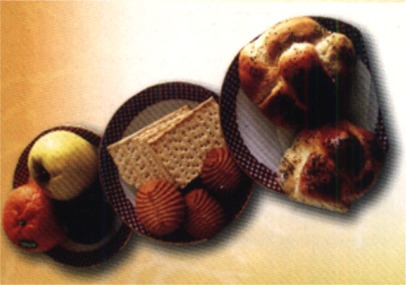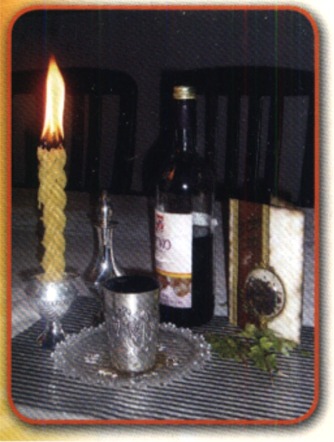- פרטים
-
קטגוריה: Shabbat Pleasantness
-
פורסם בשבת, 21 נובמבר 2020 16:51
-
נכתב על ידי Super User
-
כניסות: 324
Shabbat Afternoon - Mincha and Third Seuda
One should take advantage of the special sanctity of Shabbat afternoons in order to study Torah, recite Tehillim and learn Torah with his children, listening to them and instilling them with Jewish values. One should explain the importance of refraining from slander and evil speech, performing acts of kindness and developing good character traits. Shabbat afternoon is also a suitable time to study the laws of the day from a halachic work.

Our sages have said (Talmud Yerushalmi and the Midrash: “Sabbaths and festivals were given to the Jews only so that that they should engage in Torah on them. During the week, they are occupied with their work and don’t have time to engage in Torah study with the fitting commitment. On Shabbat, though, they are free from work and thus able to dedicate themselves to Torah properly.”
On this sacred day, everyone can rise spiritually by observing Shabbat and upholding its sanctity.
Mincha and the Third Seuda
One eats a third meal either before or after the Mincha prayer.
It is preferable to make a ha’motzi blessing over two challos before starting the meal, as we do at the other Shabbat meals. But if one finds that difficult, he may eat cake instead, and if that too is difficult, he may eat fruit.
One takes his children to the synagogue for the Mincha prayer, and hears the Torah reading for the afternoon.
- פרטים
-
קטגוריה: Shabbat Pleasantness
-
פורסם בשבת, 21 נובמבר 2020 16:50
-
נכתב על ידי Super User
-
כניסות: 353
Shabbat is Over
During Shabbat, it is forbidden to do any “melacha” (a type of labor whose meaning will be explained later), until Shabbat is over, in accordance with the time which appears on the calendar.
After Shabbat is over, one says: “Baruch hamavdil beyn kodesh le’chol” – “Blessed are You Who separates between the sacred and the mundane,| and then may do such labor.
Through this prayer, we show that Shabbat, by means of its sanctity, is unlike the ordinary days of the week.

- פרטים
-
קטגוריה: Shabbat Pleasantness
-
פורסם בשבת, 21 נובמבר 2020 16:49
-
נכתב על ידי Super User
-
כניסות: 377
Havdalah Procedure

One fills a cup with grape juice or wine, places a spice, condiment or fragrant plant (such as cloves, cinnamon or myrtles) before him and a candle, which he lights during the ceremony. Then he recites the following text and blessings:
Rishon le’Tziyon hine hinam, ve’l’Yerushalayim mevaser etain. Al tismechi oyvesi li, ki nofalti kamti. Ki eishev ba’choshech Ado-nai ohr li. Ve’Noach matza chen be’eini Elo-him ve’adam. Kumi ori ki va orech. u’kevod Ado-nai alayich zarach. Ki hine hachoshech yechaseh aretz ve’arafel leumim. Ve’alayich yizrach Ado-nai u’chevodo alayich yeira'eh.
Kos yeshuot esa, u’veShem Ado-nai ekra. Ana Ado-nai hoshi’a nah. Ana Ado-nai hatzlicha nah.
Hatzlicheinu, Hatzliach dracheinu, hatzliach limudeinu, ushlach bracha, revacha vehatzlacha be’chol maasey yodeinu ke’dichtiv: Yisa beracha me’et Ado-nai u’tzedaka mei’Elo-hei yish’o. La’Yehudim hoita ora ve’simcha vesoson viyikar. U’ktiv veyehi David lechol drachav maskil, va’Ado-nai imo. Ken yehiyeh immanu tamid
Baruch Ata, Ado-nai Elo-heinu, Melekh ha-olam,
bore p’ri ha-gafen.
Baruch ata, Ado-nai Elo-heinu, Melekh ha-olam,
bore minei vesamim (and one inhales the aroma of the spice).
Baruch Ata, Ado-nai Elo-heinu, Melekh ha-olam,
bore me'orei ha-esh.
Baruch Ata, Ado-nai Elo-heinu, Melekh ha-olam, ha-mavdil bein
kodesh l'chol, bein or l'choshekh, bein yisrael la-amim, bein yom ha-sheviyi l'shayshet yemey ha-ma'aseh, Baruch Ata, Ado-nai, ha-mavdil bein kodesh l'chol,
(If one doesn’t have spices or a candle, he may recite only the blessing over the wine and the mavdil blessing)
- פרטים
-
קטגוריה: Shabbat Pleasantness
-
פורסם בשבת, 21 נובמבר 2020 16:48
-
נכתב על ידי Super User
-
כניסות: 293
The Merit of Shabbat
The Chofetz Chaim writes the following (in the introduction to the MishnaBerura, Part Three):
“The merit of observing Shabbat according to the halacha is effective in gaining forgiveness of all of ones sins.”
We can achieve this by spurring ourselves to study the laws of Shabbat repeatedly, in order to know what is forbidden and permitted on that day.
Observing Shabbat correctly expedites the arrival of the Redemption, as our Sages of blessed memory have said: “If the Children of Israel would keep two Sabbaths [according to the law] they would be redeemed immediately.”
There are many Shabbat laws regarding all facetsof the day, which one must know. Today, there are many books and pamphlets explaining these laws in a clear manner.
Consult a rabbi for guidance on which books are suitable for you..
Every increment in one’s Shabbat observance is very important in Shamayim (Heaven). May you be blessed for your efforts.




